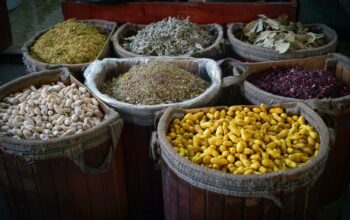The UN Jordan Sustainable Development Framework 2018-2022
When one studies political reports of Jordanian institutions like ministries, one sometimes stumbles upon acronyms starting with the letters U and N: UNESCO, UNICEF, UNDP. Often, these acronyms in governmental texts, reports and studies indicate UN involvement, with the capitalized U and N standing for the United Nations. But who are the United Nations and what are they doing in Jordan exactly? This article breaks down the role of the UN in the country and provides some examples of the important work they do. The United Nations is an international organization founded in 1945 by 51 countries. Its goal is to achieve and maintain international peace and security, develop positive relations among countries, and promote social progress, improved living standards, and human rights. Today, the UN provides a forum for discussion for its 193 Member States through different bodies and committees and can take action on a wide range of issues.
In Jordan, the UN is active through the respective United Nations Country Team (UNCT). The team consists of 19 UN agencies, funds, programmes, and the World Bank. Its work is guided by the UN Sustainable Development Framework (UNSDF) 2018 – 2022, the main tool for planning and implementation of UN development activities in Jordan. The framework was signed not only by the UN, but also by the Jordanian government, ensuring coordination between the UN and the government to meet its goals. It is based on the principles of the Sustainable Development Agenda. The agenda is an international plan for sustainable development adopted by all UN Member States in 2015. It sets 17 goals to improve living standards and protect the planet until 2030: no poverty; zero hunger; good health and well-being; quality education; gender equality; clean water and sanitation; affordable and clean energy; decent work and economic growth; industry, innovation and infrastructure; reduced inequalities; sustainable cities and communities; responsible consumption and production; climate action; life below water; life on land; peace, justice and strong institutions; and partnerships for the goals.
Guided by these sustainable development goals, UNSDF 2018 – 2022 is the strategic framework of different agencies, working groups and task forces that cooperate to facilitate the work of the Country Team. UNSDF 2018 – 2022 prioritizes three areas:
- strengthened institutions
- empowered people
- enhanced opportunities
The first priority, strengthened institutions, has the goal of contributing to responsive, inclusive, accountable, transparent and resilient national and local Jordanian institutions. To achieve this goal, the UN supports the government to create new legislations, change existing legislations, and develop strategies and capacities to build strong institutions. It organizes spaces for politicians to discuss new policy implementations, conducts studies that may guide politicians in their decision-making, and develop strategies together with governmental bodies like ministries. Of course, the UN does not have the power to interfere with national regulations and policies – all it can do is make recommendations and support the executive. It is thus important to maintain positive relations with the Jordanian government.
With the second priority, empowered people, the UN wants to encourage citizens to claim and know their rights and fulfil the responsibility for improved human security and resilience. It is a priority that focuses on the responsibility of the people, not the government, to influence their living situation in the framework possible – a framework that, admittedly, can be rather small. That is why the UN not only tries to address behavioural change, but also supports individuals educationally and materially. For example, the Country Team attempts to improve equal access to information, education, and services. This priority is thus not only about informing citizens on their inalienable rights, but also about empowering them through opportunities. The UN organizes trainings on life and digital skills through UNICEF and conducts awareness-raising training sessions on topics such as child labour and child exploitation. In 2021, UNICEF also provided material support in the form of tablets to vulnerable Syrian families, so that children could access educational platforms online.
Lastly, the area of enhanced opportunities attempts to include all people living in Jordan in the social, economic, environmental, and political fields of the country. Economically, for example, the UN helps individuals to develop necessary skills through trainings to facilitate easier access to the labour market. Unemployment, particularly youth unemployment, is one of the most pressing issues in Jordan. In the fourth quarter of 2021, 51.1 % of people between 15 – 24 were unemployed. The UN also offers short-term job opportunities through intensive infrastructure programmes. Apart from economic opportunities, it conducts surveys to influence policymaking on political and social issues. In 2021, for example, UN Women together with the UNDP conducted a national survey on public perception towards women’s political participation. This shows enhanced opportunities must not only be economical, but social and political, as well.
While the challenges in Jordanian society and politics are huge, so are the actions the UN takes towards sustainable development in the country. Through its Country Team, the organization can substantially support Jordan to achieve the goals set in the Sustainable Development Agenda. The three priorities of strengthened institutions, empowered people, and enhanced opportunities set the tone for its work in the country. For the years 2023-2027, the UN Country Team is currently working on a new Cooperation Framework.
Dalea Awada
Sources
2021 UN Jordan Annual Results Report, United Nations Jordan, 2021.
United Nations Jordan. “UN Sustainable Development Framework in Jordan (2018 – 2022)”, 5 December 2017, available from https://jordan.un.org/en/40978-un-sustainable-development-framework-jordan-2018-2022, last access 21 June 2022.
United Nations. “History of the UN”, available from link.
United Nations. “The Sustainable Development Agenda”, available from https://www.un.org/sustainabledevelopment/development-agenda/, last access 21 June 2022.



